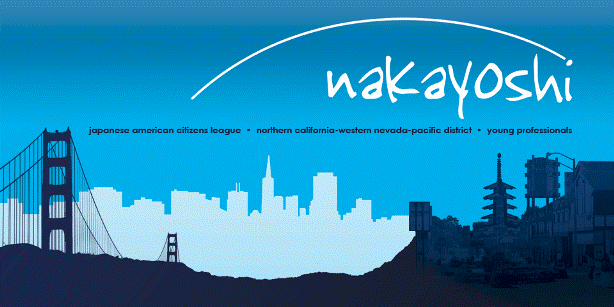In commemoration of the 20th anniversary of the Civil Liberties Act of 1988, the Pacific Citizen, the newspaper of the Japanese American Citizens League, called for submissions on the topic of Redress. This is the article I wrote, which was recently published in the 2009 New Year's Edition of the Pacific Citizen. Hope to hear your thoughts.
Akemashite Omedeto!
Jess
It was the summer before sixth grade. I was in Ms. Dion’s class at Daruma-no-Gakko, a four week summer program for Japanese American elementary school students. Every foggy East Bay morning, my grandpa would my brother and I off in the parking lot outside a local church. There, John and I spent our summer morning making crafts, singing folks song, and cooking traditional food.
For the sixth graders at Daruma-no-Gakko, learning about what it meant to be Japanese American meant learning about our history, from our great grandparents who emigrated from places like Fukuoka and Hiroshima, to our grandparents who grew up playing baseball in camp, and our parents who came of age in the tumult of the 1960s.
For me and my classmates, we learned about the passage of Redress as history. In 1988, I was three years old and my brother was even born. For me, the story of Redress is not part of my own memory, but rather part of a collective memory shared by parents and grandparents and the community I grew up in.
Flash forward and I am a graduate student in public policy at the University of California, Berkeley. I am spending my last summer as a student interning with the Children’s Defense Fund, a nonprofit advocacy organization in Washington, DC.
During my lunch hour, I walk to the Japanese American National Memorial, which happens to be three blocks from my office near the Capitol. I sit near the edge of the fountain; eating my foil-wrapped sandwich and watching small birds splash around in the rushing water. As wandering tourists pass by, I wonder whether they understand the significance of this place.
The presence of such a memorial is itself testament to the perseverance, the gaman, of the Japanese American community.
As we celebrate the twentieth anniversary of Redress, it is an opportunity to reflect upon our history, but more importantly our fundamental values. As Japanese Americans, as Asian Americans, and people of color, we have experienced many injustices at the hands of the government. Yet we have also experienced the righting of wrongs and the process of reconciliation. Although a check for twenty-thousand dollars and President Reagan’s signature could not bring back lost years or lost opportunities, Redress is a testament of American values of justice and equality.
Many of the times I spent sitting at the Japanese American memorial, I not only thought about my family’s history, but also my own future. My decision to pursue the study of government, particularly objective analysis, is in itself a testament to my faith in democracy and my hope for social justice. Yet my undergraduate background in Ethnic Studies taught me that the story of Redress for Japanese Americans is more of an exception than a rule.
My sophomore year at Brown University, I took a class in post civil war African American history. By chance, it was the same semester that the school was revisiting its role in the transatlantic slave trade and slavery in the United States. In fact, the oldest building on campus was built by the hands of a slave and some of the members of the Brown family had participated in the slave trade.
For my final paper in the class, I wrote a comparison between the Japanese American and African American experiences and the prospects for redress and reparations. While there are many differences between our histories, they evoked the same gut wrenching feeling of injustice and inequality.
In the class, we discussed the concept of reparations and redress. We talked about the experiences of the Jewish Diaspora after the Holocaust and the healing of South Africa after Apartheid. I learned that Japanese Americans are one of the few groups who have ever received monetary reparations for past injustice. The system is not always fair; actually, it usually is not.
How does the history of Redress inform my life and my work as a young Japanese American? It reminds me every day that there is injustice in this world, but also that there is always hope for change. As we approach the November election, it reminds me of the importance of civic participation, particularly for Asian Americans and communities of color. The story of Redress also reminds me that we must continue to fight for justice, both within and outside of politics. Redress was won not only by high profile leaders who maneuvered the political system in Washington, but also by community activists back home in San Francisco, Los Angeles, and Seattle.
This summer in DC, I interned at the Children’s Defense Fund. It is not an organization that advocates particularly for Japanese Americans or Asian Americans and Pacific Islanders, but for all American children. Under the leadership of Marian Wright-Edelman, it positions itself between vulnerable children and the federal government, serving as a voice for those who cannot speak for themselves. As a Japanese American, standing on the shoulders of the many activists before me, I am inspired to be part of this effort, tackling the same racial inequality that our community has experienced as well.Wherever we find ourselves as young Japanese Americans, whether it be in the Japanese American community or outside of it, inside of government or outside, I hope that we can continue to work toward the same values that are fundamental to our history. We hold a powerful legacy, one of dignity and perseverance; a legacy that testifies to the paramount importance of justice, equality, and freedom. I hope we can honor the work of those who came before us in our work today and tomorrow.

No comments:
Post a Comment